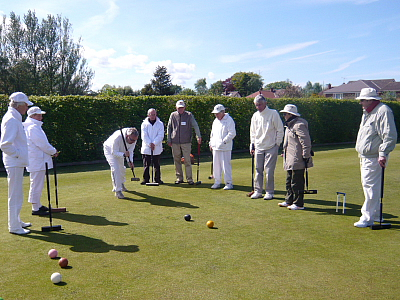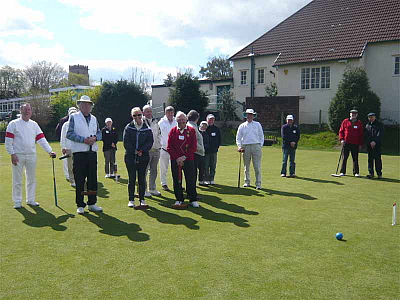Flying Circus Croquet Coaching in 2015
What coaching course does your club need in 2015?
We have coaches standing by ready to help. Just let me know what you need and I will match your club’s need to the coaches available.
Courses are available in Golf and Association Croquet for all levels from beginners to A-class. Each Flying Circus course is typically 1 day long and caters for 8 – 16 players of a similar ability.
Best of all – in the North West, our courses are free to all club members.
All North West Clubs who would like to hold a course should contact the Federation secretary, Paul Rigge – paul.rigge@tiscali.co.uk
Course for Handicap 16-20: Bowdon Friday 10th April 2015
Coached by Ken Cooper, this ever popular 1- day North-West Federation Bronze Course concentrates on the important parts of the CA’s 2-day Bronze course and covers openings, split croquet strokes, hoop approaches, basic cannons, 4-ball breaks, general strategy against better players, break management, plus blackboard lessons on 3-ball endings (if time permits).
The course will be run from 10am- 4pm. Bring your own lunch. This tends to be a very intense day to get everything covered but well worth it in the end.
The course is free of charge but spaces are limited. If you are interested in attending please let Ken Cooper know ASAP – kenco99@btinternet.com
Coaching Training Course
Last year we ran a very successful 2-day course for aspiring coaches at Chester. This year Westmorland has 2 people who want to complete this course so if there are at least 4 others in the area who want to attend this them we can arrange it.
This 2-day course aims to improve coaching skills and enables players to have the opportunity to be assessed as part of their development as a graded coach. The course includes both theory and practice covers:
- Responsibilities of a coach
- Planning a coaching course
- Principles and techniques of good instruction
- Planning and preparation of a lesson
- Practical advice, hints and tips for delivering a lesson
- Resources for croquet coaches
- The CA coaching structure
Anyone seeking to become Club Coaches, CA grade 1, 2, or 3 Association coaches or CA Golf Croquet coaches may attend. To attend the course you are expected to have a working knowledge of the rules of Association Croquet and/or Golf Croquet.
Westmorland have offered to host this, or if another Club is interested then the 2 Westmorland people will travel.
Please contact me the Federation Secretary if interested.
paul.rigge@tiscali.co.uk

